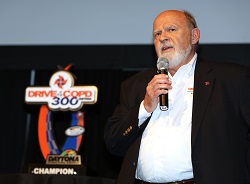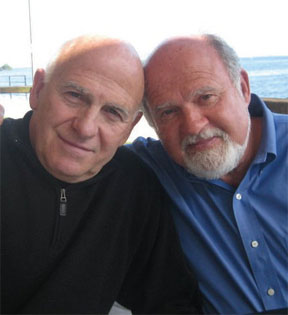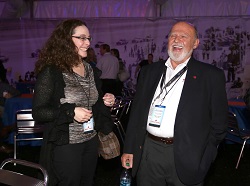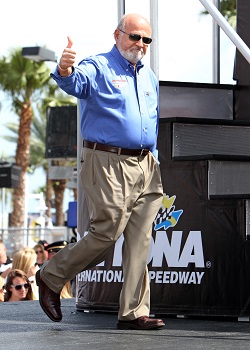By Bill Clark, Senior Director of Community Outreach, COPD Foundation
The COPD Foundation is saddened to report that John W. Walsh, our founder and president, passed away on March 7, 2017 as a result of complications from an accident in 2016. How do you begin to memorialize a man who was a legend and hero to millions who suffer from chronic illness - not only in this country but around the world? A man who was a beacon of hope for those who once felt alone, a voice for those who felt no one cared, a man who gave a face to a disease that was once hidden, and a visionary who found solutions to problems no one could solve? How do you honor a man who reinvented how research is executed in the COPD space?
When diagnosed with Alpha-1 Antitrypsin Deficiency, a rare genetic form of COPD, along with his twin brother Fred, John did what he always did throughout his life- he looked for answers. A veteran and businessman, his search led him to walk away from his business and co-found the Alpha-1 Foundation, a patient organization dedicated to education and research. John’s efforts led to recognition of the disease across the world as other countries came to adopt the visionary guidelines established for the Alpha community.
 Through national and regional conferences, along with dedicated support groups, John’s leadership and vision galvanized the Alpha community. It wasn’t long before recognition led to new and exciting research culminating in the development of the first effective therapy for Alpha-1. When John found that a shortage of the therapy was endangering the community, he co-founded AlphaNet, a groundbreaking non-profit disease management company whose “simple” goal was to improve the lives of those individuals affected by Alpha-1 while at the same time funding vital research for a cure, now totaling over 50 million dollars.
Through national and regional conferences, along with dedicated support groups, John’s leadership and vision galvanized the Alpha community. It wasn’t long before recognition led to new and exciting research culminating in the development of the first effective therapy for Alpha-1. When John found that a shortage of the therapy was endangering the community, he co-founded AlphaNet, a groundbreaking non-profit disease management company whose “simple” goal was to improve the lives of those individuals affected by Alpha-1 while at the same time funding vital research for a cure, now totaling over 50 million dollars.
In John’s quest to identify other Alphas, he discovered a much bigger and largely unrecognized community: those with COPD. Before that time, COPD was what John liked to call a disease of “shame and blame”: misunderstood, misdiagnosed, mistreated, underfunded, and lacking adequate research. In 2004, using the successful Alpha-1 Foundation model, John formed the COPD Foundation. Gathering together a dedicated team of professionals and fellow patients, John soon expanded the reach of the Foundation to include the COPD Digest, the Mobile Spirometry Unit, the C.O.P.D. Information Line, The Journal of COPD, and the DRIVE4COPD campaign.
 To increase funding for research and patient access, John established the COPD Advocacy Program and the Congressional COPD Caucus. In an effort to bring new innovation in drug therapies, John established the COPD Biomarkers Qualification Consortium, The COPDGene Study, The COPD Patient-Powered Research Network, and the Bronchiectasis Research Registry. With the popularity of social networks, John was the vision behind the COPD360 initiative in an effort to make the Foundation a “one stop shop” for everything COPD, which resulted in the formation of COPD360social (an online COPD community), PRAXIS (a community allowing professionals to interact with each other and the patients they serve), along with a wealth of web-based information.
To increase funding for research and patient access, John established the COPD Advocacy Program and the Congressional COPD Caucus. In an effort to bring new innovation in drug therapies, John established the COPD Biomarkers Qualification Consortium, The COPDGene Study, The COPD Patient-Powered Research Network, and the Bronchiectasis Research Registry. With the popularity of social networks, John was the vision behind the COPD360 initiative in an effort to make the Foundation a “one stop shop” for everything COPD, which resulted in the formation of COPD360social (an online COPD community), PRAXIS (a community allowing professionals to interact with each other and the patients they serve), along with a wealth of web-based information.
With John’s encouragement, the COPD Foundation changed its mission statement to reflect an additional goal…a cure for COPD. To that end, the Foundation became a founding member of Patient-Centered Outcomes Research Institute (PCORI) to drive patient-centered research. In an effort to brainstorm solutions, John developed the first of its kind biennial “COPDusa” conferences aimed at mobilizing both professional and patient stakeholders in the community.
 When it came to his patient community, John made the impossible possible, and the world took notice. Through the years, John received many awards which he accepted but for which he never took full credit. He felt the honors were in recognition of the community he loved and the people in his life; especially his loving wife Diane who he often described as the love of his life, conscience, and right hand. Other than with his family, John often said he was the happiest when he could spend time with others affected by lung disease. He loved to talk to them about their lives, their struggles, and their dreams for the future, always coupled with a message of hope and the knowledge they were not alone. Regardless of where he was, what he was doing, or who he was talking to, John would drop whatever he was doing if he saw a fellow patient in need. At an event, if he saw someone in distress, he would immediately go to assist them and offer whatever help he could.
When it came to his patient community, John made the impossible possible, and the world took notice. Through the years, John received many awards which he accepted but for which he never took full credit. He felt the honors were in recognition of the community he loved and the people in his life; especially his loving wife Diane who he often described as the love of his life, conscience, and right hand. Other than with his family, John often said he was the happiest when he could spend time with others affected by lung disease. He loved to talk to them about their lives, their struggles, and their dreams for the future, always coupled with a message of hope and the knowledge they were not alone. Regardless of where he was, what he was doing, or who he was talking to, John would drop whatever he was doing if he saw a fellow patient in need. At an event, if he saw someone in distress, he would immediately go to assist them and offer whatever help he could.
John, who often described himself as an “impatient patient,” believed new therapies and advances towards a cure should be patient-centered and patient-driven. He was confident that by uniting and energizing a community, change would inevitably happen. He envisioned legions of patients and their caregivers one day coming together for what he would often joke as being, “the slowest march in history.”
Early on John saw technology as a means to provide better health outcomes for the community. He was instrumental in organizing meetings with top technologists and medical professionals that resulted in a wave of development across the world to improve patient quality of life that continues even today. John engaged other professional and co-morbid organizations in strategic alliances in an effort to unite efforts towards common goals, and participated on numerous government boards to represent the interests of the chronically ill.
John, who believed lung disease wasn’t restricted to just one country, co-founded COPD Global to unite healthcare providers and patients in an effort to establish best practices in the treatment of COPD worldwide. Whether it was confronting the implications of pollution in developing countries, the implications of fossil fuel heating and cooking, or the lack of healthcare in developing countries, John traveled and spoke, often at the request of world leaders and at the risk of his own health, to offer key insights and advice along with providing resources developed in their languages. In the face of Hurricane Katrina, John dispatched a staff member to report on the COPD patients in the region which then led to the development of a disaster preparedness kit for those with chronic illnesses.
When it came to his community, no challenge was too large or small to tackle. John, always a visionary, surrounded himself with motivated, well-qualified surrogates to help bring his vision to fruition. In his world, John knew all the players, and was as comfortable walking down the halls of Congress, research centers, or corporations as he was walking down the streets of his hometown. Many thousands of people, regardless of their economic means, health challenges, race, religion or sexual or ethnic origins will claim the honor of being John’s friend, and they would be right- for with John all that mattered was that you shared his belief that no person should ever have to suffer from a chronic disease.
 Working for John was as often as challenging as it was rewarding. He never worked under the constraints of a time clock. His workplace was an airplane seat, a hotel room, a lobby, or on rare occasions, his office. Deadlines were too often tight, expectations high, and workloads beyond belief. John expected those on his team to be as passionate and as dedicated as he was. As tragedies and joys touched each of our lives, John made his love and support known because he considered us all to be a part of his family. We came to see the world through John’s eyes. Through his example and enthusiasm, we learned compassion and the value of fighting for the needs of others. When John brought on new people he would tell them that, “together we will do amazing things,” and like everything else, he was right. John’s zest for life and his work were infectious to all who were honored to know him.
Working for John was as often as challenging as it was rewarding. He never worked under the constraints of a time clock. His workplace was an airplane seat, a hotel room, a lobby, or on rare occasions, his office. Deadlines were too often tight, expectations high, and workloads beyond belief. John expected those on his team to be as passionate and as dedicated as he was. As tragedies and joys touched each of our lives, John made his love and support known because he considered us all to be a part of his family. We came to see the world through John’s eyes. Through his example and enthusiasm, we learned compassion and the value of fighting for the needs of others. When John brought on new people he would tell them that, “together we will do amazing things,” and like everything else, he was right. John’s zest for life and his work were infectious to all who were honored to know him.
His vision will remain a driving force for the organizations he founded using the ideals he established. We are the caretakers of his legacy, and by using the roadmap he established, we will always base every decision with the question, “what would JWW do?” His dream that one day a Foundation such as ours will no longer be needed will continue to be the driving force behind all we do. When the history of COPD is written, future generations will know his name and the results of the work he pioneered. New therapies and technology will be developed and cures will be found, and much of it will be because of John W. Walsh.
John always closed his messages and conversations with the simple words, “keep the faith.” John gave us the faith to reach for the stars in everything we did. The COPD community in both the U.S. and across the globe, has been lifted up beyond any physical restraints to aspire to something greater than themselves, to achieve that which never has been done, all because John W. Walsh cared. In coming days and years when we speak of John, we will remember happier times with a man we truly respected and loved, who challenged us to heights we thought we could never reach. In grief we will always miss him, but in thankfulness we will be grateful that he touched our lives and allowed us the gift of being a part of his amazing journey.
John W. Walsh is survived by his devoted wife Diane, daughter Linda, and granddaughter Lily. Also surviving are his twin brother Fred Chase Walsh and sisters Susan Walsh Ferro and Judith ‘Juba’ Morton Walsh. They, along with an extended family of cousins, nieces, a nephew, their families, and many others, will miss John’s warmth, compassion, and spirit of life.